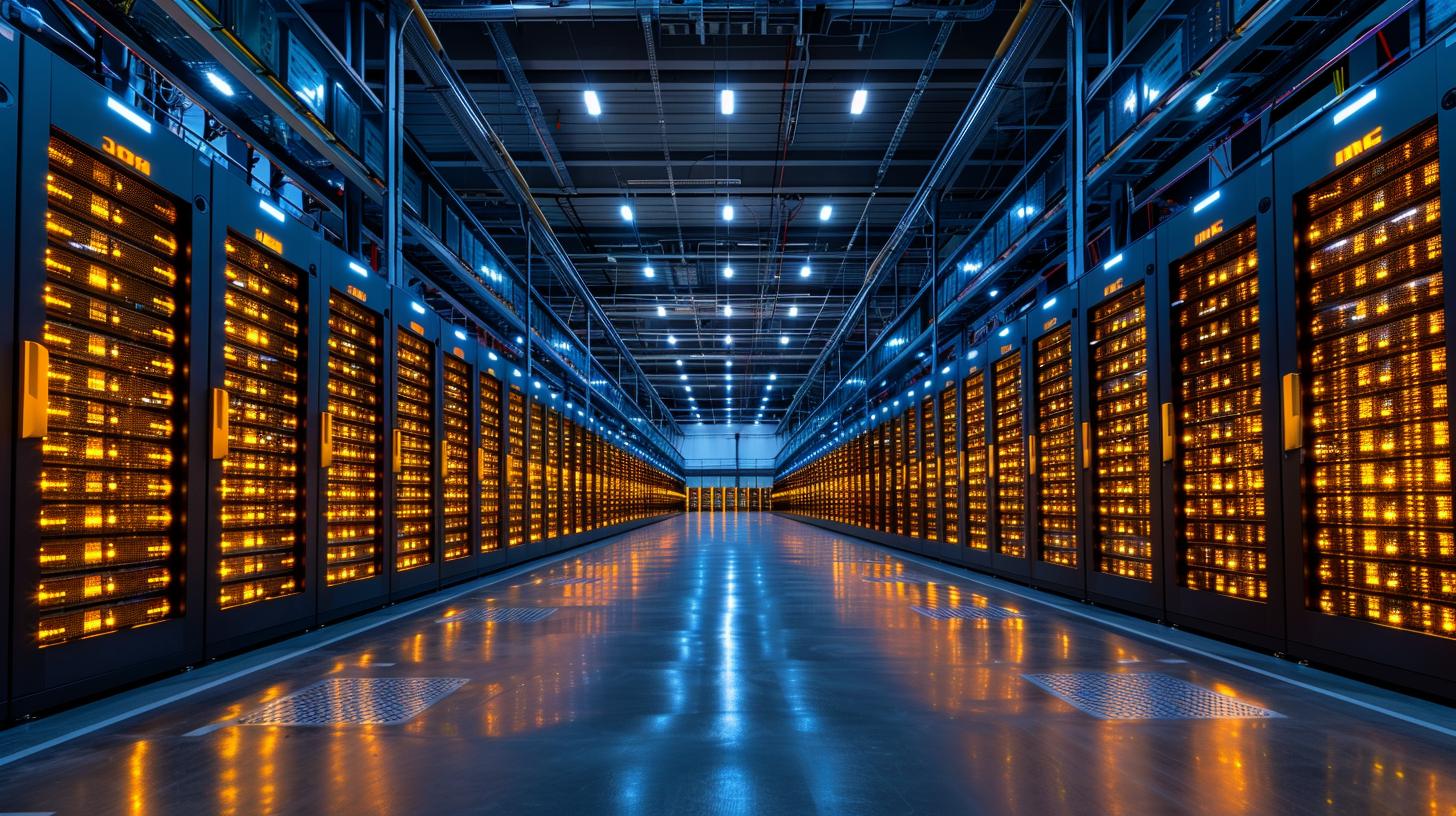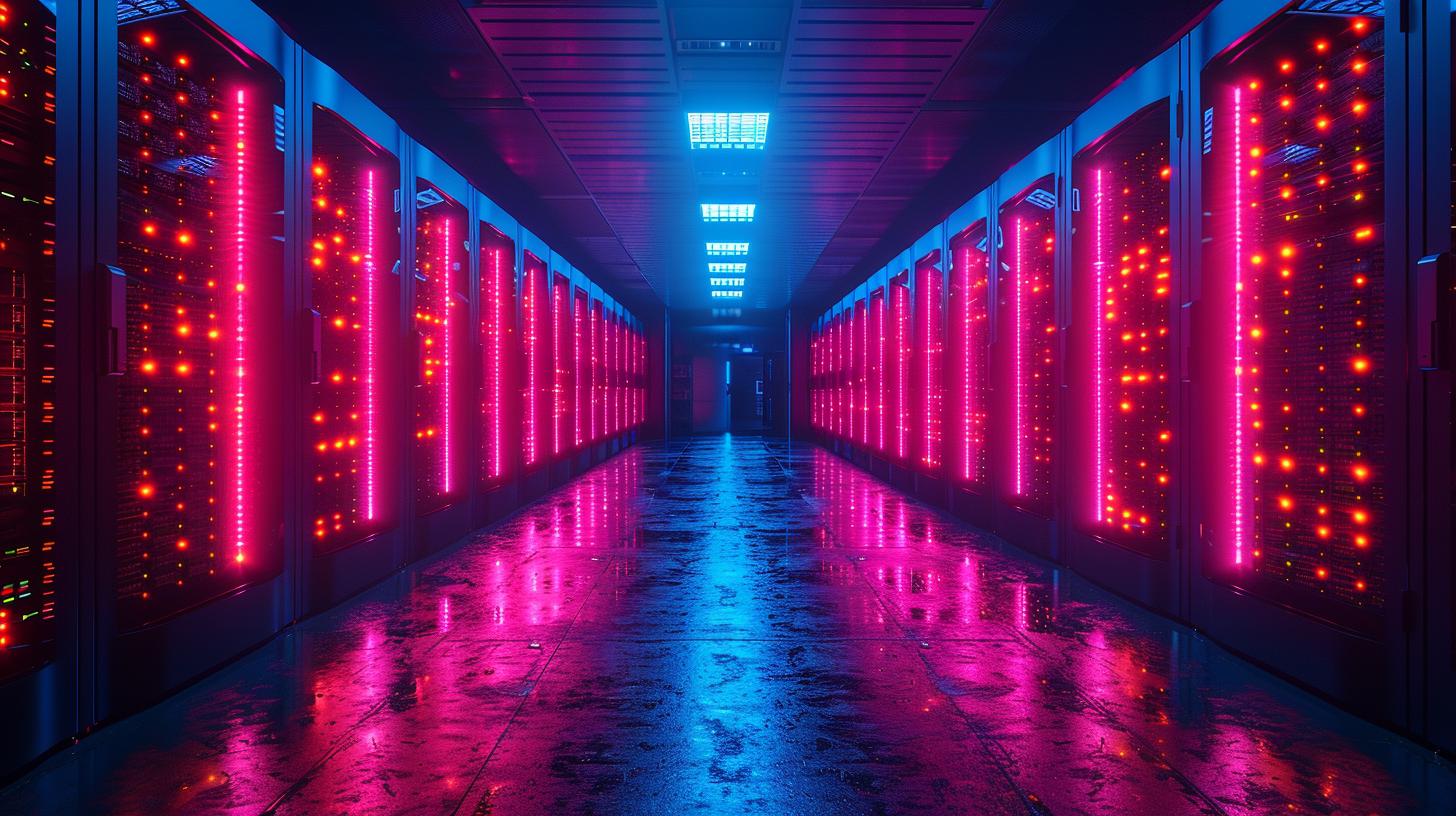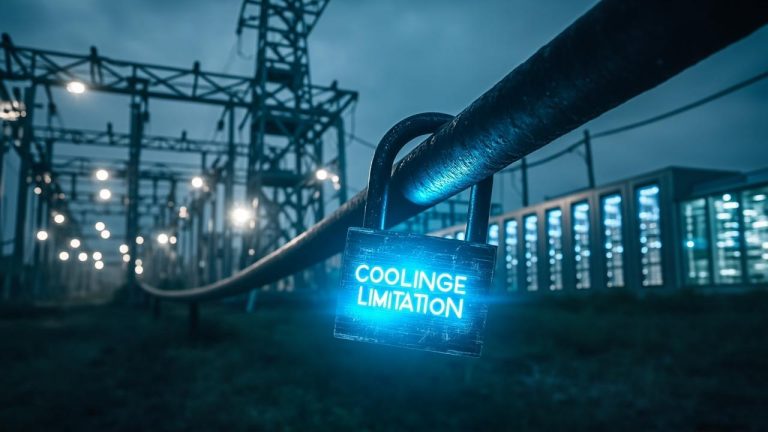Cryptocurrency has revolutionized the financial landscape, introducing a new realm of digital assets that are underpinned by a complex and fascinating technology known as blockchain. At the heart of this technological innovation is cryptocurrency mining, a critical process that not only generates new digital currency but also ensures the integrity and security of transactions on the blockchain.
With the rise in popularity of cryptocurrencies such as Bitcoin, Ethereum, and many others, understanding how server sourcing cryptocurrency can impact success has become increasingly important for those participating in this space.
Mining serves as the backbone of the blockchain ecosystem. Miners use powerful computers to solve intricate mathematical problems which in turn validates transactions and adds them to the public ledger, known colloquially as the blockchain.
This endeavor is not just a crucial task for maintaining network security but is also rewarded with newly minted coins, incentivizing miners to continue contributing their computational power. As cryptocurrency gains more mainstream acceptance, so too does mining grow, developing into a significant industry that attracts investors and tech enthusiasts alike.
Recent trends show an unprecedented growth in cryptocurrency mining operations worldwide, due in part to crypto’s rising value and expanding awareness among both individual enthusiasts and large corporate entities. Moreover, advancements in computer hardware have made it possible for miners to optimize their operations for better returns on investment. However, amidst this rapid expansion lies an underappreciated yet key element-optimizing server sourcing strategies.
Successful mining depends heavily on having robust servers capable of handling extensive workloads efficiently while being cost-effective over time. The choices made during server sourcing can make or break a mining operation’s profitability and sustainability in this vibrant but volatile domain.
Understanding Server Sourcing in Cryptocurrency Mining
Cryptocurrency mining has quickly transitioned from being a hobby for tech enthusiasts to a serious industry where substantial profits can be made. At the heart of this process is the use of powerful computers that solve complex mathematical problems, contributing to the blockchain ecosystem’s growth and security.
The more effective these computers, or servers, are at solving these problems, the more likely a miner is to earn cryptocurrency rewards. Amidst stiff competition and ever-increasing difficulty levels in mining algorithms, sourcing the right servers has become critical for anyone looking to profit from cryptocurrency mining.
Server sourcing in this context refers to the process of selecting and acquiring the servers capable of handling the intense computation required for cryptocurrency mining. It’s not merely about finding a computer with adequate processing power; it involves an array of considerations that directly impact mining efficiency and productivity.
Importantly, these servers often run at full capacity 24/7, so aspects such as durability, energy consumption, and heat dissipation take on added significance. High-performance servers are favored because they can offer:
- Increased hash rates which translate into better chances of validating transactions and earning cryptocurrency,
- Improved energy efficiency lowering long-term operational costs,
- Better longevity due to quality components reducing downtime from hardware failures.
These varied types of servers can range greatly in configuration and sophistication. From custom-built rigs designed for maximum hash rates to repurposed enterprise-grade servers retooled for mining purposes, each approach carries its own set of pros and cons.
For example, ASIC (Application-Specific Integrated Circuit) miners are tailor-made for specific cryptocurrencies making them highly efficient but less versatile compared with GPU (Graphics Processing Unit) miners that can mine multiple types of cryptocurrencies but might consume more power. FPGA (Field Programmable Gate Array) servers strike a balance by offering reprogrammable hardware catered towards specific coins without being limited to single use.
Server sourcing cryptocurrency decisions require meticulous planning and technical knowledge-miners must choose equipment that not only fits their current needs but also allows room for growth as demands change over time. Addressing this complexity gives rise to experts specializing in server solutions tailored exclusively toward cryptocurrency mining-a service becoming increasingly invaluable as the space matures and expands.
The Importance of Data Airflow in Mining Servers
Understanding Data Airflow and Server Health
Data Airflow refers to the efficient movement and management of air within a mining server or data center environment, which is crucial for maintaining optimal temperatures and ensuring hardware longevity. Mining crypto generates significant heat, due to the intense computational workload placed on specialized processors like ASICs or GPUs.
Without proper cooling techniques facilitated by effective data airflow, these components can overheat, leading to reduced efficiency, potential failure, and shortened lifespan. Managing airflow isn’t just about cooling but also maintaining consistent temperature ranges across various components to prevent thermal stress that could compromise server performance.
Thermal Management’s Impact on Mining Operations
Effective thermal management goes hand in hand with optimized data airflow. It’s not just about ejecting hot air from the server; it’s about doing so in a way that does not recirculate the exhausted heat back into the system.
Introducing cool air at strategic points is necessary to maintain an overall balance within the server room or data center housing the mining rigs. Moreover, poor thermal management can lead directly to wasted energy-which is already one of the most significant operating costs associated with cryptocurrency mining-compounding inefficiencies and inflating operational expenses in an industry where margins can often be thin.
Strategizing Data Airflow Optimization
Employing effective strategies for optimizing data airflow involves several factors including physical server design, placement within a facility, and environmental control systems such as HVAC units with precise configuration tailored for crypto mining operations. Arranging servers in hot/cold aisle configurations ensures that there’s a systematic approach to heat dissipation. Additionally, deploying containment systems can help isolate different thermal zones to prevent mixing of air at disparate temperatures.
Server sourcing cryptocurrency operations must be mindful of these considerations because selecting equipment without evaluating its compatibility with good airflow practices could hamper overall success. Advanced servers are now being designed specifically with improved ventilation features that accommodate high-density setups common in cryptocurrency mining while using fewer fans or more effective cooling solutions like liquid immersion cooling systems which are becoming increasingly popular due to their superior heat transfer properties.

These approaches not only enhance efficiency but also potentially reduce noise pollution-a secondary concern for large scale operations often located in proximity to populated areas.
Server Sourcing Cryptocurrency
As the cryptocurrency mining industry expands, there’s a pressing need to carefully assess the cost versus performance equation-especially when it comes to server sourcing cryptocurrency operations. Getting this balance right can significantly affect profitability and sustainability in an increasingly competitive field. Servers are not only the workhorses of mining rigs but also represent one of the most substantial investments for any miner.
- Evaluating Server Costs: When considering server sourcing, miners must evaluate both upfront costs and potential return on investment (ROI). This involves examining server specifications against their ability to handle complex calculations efficiently. More expensive servers with higher computational power may provide faster returns due to improved hash rates but can also increase initial overheads.
- Mining Efficiency Correlation: The server’s processing power directly correlates with mining efficiency; hence, higher-end servers tend to produce better results. However, any increase in capabilities should be weighed against energy consumption since electricity costs can erode profits over time.
- Total Cost of Ownership: A savvy miner looks at the total cost of ownership (TCO), which includes purchase price, operating expenses, maintenance, and potential downtime costs. Evaluating TCO helps provide a clear picture of long-term financial implications rather than just short-term expenditure.
The impact of selecting suitable servers extends beyond immediate fiscal considerations; it influences the bottom line over the entire lifespan of the mining operation. For instance:
- Analyze Performance Metrics: When considering servers for your mining operation, don’t just focus on price tags. Look deeper into performance metrics like hash rate efficiency (number of hashes per watt of power). Optimizing for efficiency reduces energy costs and enhances ROI.
- Consider Longevity and Durability: Invest in durable servers designed to withstand continuous operation under taxing conditions common in cryptocurrency mining. Downtime due to hardware failures can prove costly both in repairs and lost mining opportunities.
- Benchmark Against Industry Standards: Rigorously benchmark potential server purchases against prevalent industry standards and reviews from other miners who have utilized similar setups can offer invaluable insights that go beyond manufacturer specifications.
Tips for balancing costs include exploring second-hand or refurbished options that still meet mining requirements or looking into lease-to-own financing models that alleviate upfront expenditures while keeping technology up-to-date.
Components of an Optimized Cryptocurrency Mining Server
In the competitive world of cryptocurrency mining, every advantage can make a significant difference in both performance and profit. A well-optimized server is often the foundation of efficient mining operations. Understanding the essential components that contribute to a robust and optimized mining server is critical for miners looking to maximize their output.
Critical Server Components for Maximized Mining Output
An optimized cryptocurrency mining server is composed of various critical components that work together synergistically. At its core, the central processing unit (CPU) or graphics processing unit (GPU), depending on the mining algorithm, plays a primary role in solving complex cryptographic equations. However, it’s often GPUs that offer better performance for this task due to their ability to handle parallel computing tasks more efficiently.
Another vital component of a mining rig is the motherboard; it must be compatible with high-performance GPUs and allow for multiple cards to be connected if one wants to scale up their mining efforts. Moreover, sufficient memory or RAM is necessary to support the system’s operation without bottlenecking performance.
Power supply units (PSUs) are also crucial since they need to provide stable and reliable power under constant load; inefficiency in PSUs can lead not only to higher electricity costs but also potential damage to sensitive hardware from power fluctuations.
The Latest Hardware Innovations Contributing to Mining Optimization
The landscape of hardware used in cryptocurrency mining servers evolves rapidly as manufacturers aim to cater to the specific needs of this niche market. In recent times, innovations such as ASIC miners (Application Specific Integrated Circuits) have revolutionized efficiency standards by offering bespoke solutions designed solely for mining certain cryptocurrencies more effectively than generic CPUs or GPUs.
Furthermore, advances in SSD technology ensure faster access times for data-related tasks which can marginally increase overall efficiency when margins are thin. Innovative cooling systems are another area where hardware innovations have played an integral role; by managing heat more effectively through liquid-cooling solutions or advanced air-cooling setups allows miners to push their hardware further without risking thermal throttling or damage.
The Role of Specialized Software in Enhancing Server Performance
Software plays just as important a role as physical components in ensuring that a crypto mining server runs optimally. The right mining software will efficiently manage system resources and seamlessly integrate with both hardware components and the blockchain network being mined on.
Operating systems specifically designed for crypto mining can also significantly influence server optimization because they are often stripped down from unnecessary processes, thereby allowing all computer resources to focus on mining activities. Besides system software, benchmarking tools can help miners find optimal settings and identify potential issues before they escalate into larger problems affecting performance.
Moreover, firmware tailored towards specific rigs and specialized monitoring software can greatly aid in maintaining operational stability while optimizing hashing rate outputs per watt usage-providing miners clear insights into their operation’s profitability which ties back directly toward successful server sourcing cryptocurrency endeavors.
Combining these advanced technologies allows successful miners not only sustain large-scale operations but continually adapt improvements into their workflow-maximizing ROI over time with well-selected investments into the right components aimed at building an efficiently optimized cryptocurrency mining server setup.

Strategies for Effective Server Sourcing for Cryptocurrency Mining
Optimizing your cryptocurrency mining operation begins with the right server sourcing strategy. It’s a critical component that directly impacts efficiency, productivity, and profitability. When it comes to choosing suppliers for mining servers, there are multiple factors to consider, including price point, performance specifications, and after-sales support. Each decision should align with not only current needs but also anticipated future developments in your mining activities.
Identifying the right supplier is paramount for ensuring you receive high-quality equipment capable of meeting the demands of cryptocurrency mining. Suppliers should be evaluated based on their track record in delivering durable servers that can withstand the intense workload of continuous mining operations.
Trusted suppliers often offer additional benefits such as guarantees on hardware components or prioritized customer service. Additionally, assessing the level of expertise a supplier has in server sourcing cryptocurrency specific requirements can ensure they provide equipment that matches the particular needs of this unique application.
Maintenance and support hold significant value in the lifecycle of a mining server; hence selecting a supplier who offers robust assistance is essential. Unscheduled downtime can mean lost profits in the fast-paced world of cryptocurrency mining. A reliable partner offering 24/7 technical support can minimize disruptions by quickly addressing any issues that arise. Considering suppliers known for extended warranties or maintenance packages may prove economical over time and safeguard against unforeseeable failures.
Long-term considerations cannot be overlooked when sourcing servers for mining operations. As your mining endeavors grow or technology advances, scalability and ease of upgrades become crucial aspects to factor into purchasing decisions. Leveraging flexible solutions at the outset will help meet increasing demands or adapt to newer algorithms without substantial reinvestment costs down the line. The foresight to incorporate scalability within server sourcing strategies will enable miners to maintain competitiveness while keeping pace with industry evolutions.
| Provider Name | Type of Support | Warranty Period | Availability of Upgrades |
|---|---|---|---|
| AlphaTech Servers | 24/7 Technical Assistance | 5 Years | Flexible Upgrade Options |
| BetaMining Hardware | Email Support during Business Hours | 3 Years | Limited Upgrades Post-Purchase |
| CryptoServe Solutions | Dedicated Account Manager & On-site Services | Lifetime for Selected Components | Fully Upgradeable Systems |
Overall, effective server sourcing is multifaceted but achievable through diligent research and partnering with reputable vendors that can provide tailored solutions based on specific cryptocurrency mining needs.
Case Studies
Cryptocurrency mining has increasingly become a sophisticated operation requiring meticulous planning and execution. Studying successful cryptocurrency mining operations can provide valuable insights into the importance of optimized server sourcing. One such case involves a major Bitcoin mining company that strategically selected high-performance servers equipped with advanced ASIC (Application-Specific Integrated Circuit) chips.
This hardware choice helped them reduce latency, improve hash rates, and ultimately, increase profitability. By working directly with manufacturers to secure these specialized servers, the company successfully expanded its mining capabilities while maintaining operational efficiency.
Another interesting case study is a mid-size Ethereum mining operation that adopted an innovative approach to manage energy consumption-a critical component of sustainable mining strategies. They invested in servers designed for optimal Data Airflow, reducing the need for excessive cooling measures. The efficient thermal design ensured stable operation temperatures leading to less wear on components and longer server lifespans-crucial factors often overlooked by smaller operations focused solely on immediate costs.
| Mining Operation | Server Type | Impact on Efficiency |
|---|---|---|
| Major Bitcoin Mining Company | ASIC Servers | Increased hash rates and profitability |
| Mid-Size Ethereum Mining Operation | Data Airflow Optimized Servers | Reduced cooling costs and extended component lifespan |
Additionally, a group of enterprising miners combined the strengths of both centralized and decentralized resources to form a cooperative mining pool using server sourcing cryptocurrency strategies. By collectively pooling computing power while maintaining individual control over their servers, they benefited from increased hash power without compromising the flexibility of personal rigs. Sharing resources allowed members to optimize costs by jointly investing in cutting-edge servers that might have been financially inaccessible individually.
These examples illustrate how well-planned server sourcing and investment in high-quality equipment can lead to substantial improvements in cryptocurrency mining efforts. Not only do these practices enhance immediate yield, but they also contribute to building a more resilient operation capable of adapting to the market’s changing demands and technological progressions.
Future Outlook
As we look ahead, the cryptocurrency mining servers’ landscape is poised for significant change. Technological advancements continue to shape and redefine what is possible in terms of server capabilities and efficiency. The relentless pursuit of more powerful and energy-efficient hardware means that the servers used in cryptocurrency mining today may soon become obsolete as newer models with better performance are introduced to the market.
Innovations such as improved chipsets optimized for mining tasks, advanced cooling systems, and architecture designed for higher data throughput promise to make mining operations more profitable. However, these advancements also present challenges in server sourcing; miners will need to remain informed about new developments to ensure their operations don’t fall behind competitively.
It’s crucial not only to focus on the available technology but also consider the direction in which hardware evolution is moving. This prospective mindset enables miners to plan upgrades strategically without committing to technology that may soon be outdated.
Predictions for future challenges in server sourcing cryptocurrency revolve around maintaining cost-effectiveness while scaling operations. As demand for cryptocurrency continues to create opportunities for miners, the competition for getting hold of cutting-edge servers intensifies.
Future scenarios could see a gap widening between large-scale mining ventures with significant capital investment capabilities and smaller players who might struggle with acquiring top-tier equipment. This disparity underscores the importance of finding creative solutions, such as forming cooperatives or leveraging cloud-based services, which could democratize access to potent mining resources.

Overall, navigating through the evolving landscape of cryptocurrency mining servers will require agility from participants interested in maintaining and growing their positions within this competitive space. Keeping abreast of technological trends, planning strategically for future investments, and considering creative solutions are all critical steps that can contribute significantly toward long-term success in cryptocurrency mining.
Conclusion
As the cryptocurrency mining landscape continues to evolve, both new and seasoned miners must adapt to the changing demands of this competitive sector. The process of server sourcing for cryptocurrency mining has become increasingly sophisticated, necessitating a firm understanding of how different hardware and software components impact overall mining performance. Key takeaways include recognising the criticality of selecting appropriate servers that strike an optimal balance between cost efficiency and operational reliability.
For those entering the world of crypto mining, grasping the importance of optimizing each aspect of their server infrastructure is paramount. With each component playing a pivotal role in maximizing output-from GPUs and ASICs to SSDs and power supply units-it’s essential that investors make informed decisions grounded in a thorough analysis of potential long-term returns versus upfront expenditures.
Furthermore, aligning with trusted providers who can offer robust maintenance and support is crucial for ensuring ongoing efficiency, particularly as mining difficulties and blockchain complexities increase.
Lastly, it’s important for miners to keep an eye on future technological advancements that promise to reshape the industry. While current setups may be effective, staying ahead means being ready to integrate new hardware enhancements or explore alternative blockchain networks that might offer more lucrative mining opportunities.
By remaining nimble and receptive to innovation, both aspiring and veteran miners can continue to find success amidst an ever-changing digital landscape where strategic server sourcing remains a cornerstone of profitable cryptocurrency mining operations.
Call to Action
As we near the conclusion of our exploration into cryptocurrency mining and the pivotal role of optimized server sourcing, it’s important to recognize that this journey does not end with mere understanding. Success in this realm requires taking proactive steps toward improvement and refinement.
Server sourcing is undeniably at the heart of optimizing your cryptocurrency mining operations. By engaging with expert server sourcing providers, miners can access valuable insight into not only the best hardware but also vital strategies for long-term growth and efficiency.
Beginning your venture or advancing your current setup calls for an informed partnership with a knowledgeable provider specializing in server sourcing for cryptocurrency mining. These experts can help you navigate various offerings, ensuring that you choose servers that strike a fine balance between cost-efficiency and high performance. Beyond supplying the physical machinery needed to churn through complex computations, such providers often extend additional services, which could include deployment assistance, ongoing maintenance support, and tailored solutions fitting unique mining goals.
Interested readers eager to enhance their mining operations are encouraged to reach out for specialized consultations or services. Remember, the landscape of cryptocurrency mining is dynamic, with both its challenges and innovations ever-evolving. To maintain competitive advantage and optimize profitability in this space necessitates perpetual learning alongside adaptation.
Partnering with experienced server sourcing experts can provide the edge needed to thrive within this ever-changing environment. Don’t hesitate-take action today to ensure your cryptocurrency mining endeavors leverage cutting-edge knowledge on optimal server utilization for maximum efficiency and success.
Frequently Asked Questions
What Is a Crypto Server?
A crypto server generally refers to a system that participates in the operations of a cryptocurrency network. It could be performing tasks such as transaction processing, record-keeping, or mining for cryptocurrencies like Bitcoin. Each server contributes to the decentralized nature of the blockchain by helping maintain a secure and up-to-date ledger of all transactions.
What Is the Best Source to Buy Cryptocurrency?
The best source to buy cryptocurrency can vary based on multiple factors including security, ease-of-use, fees, and geographic availability. It is commonly recommended to use reputable exchanges with robust security measures and regulatory compliance.
Researching and comparing services provided by different platforms such as Coinbase, Binance, or Kraken can help you find the one that best suits your needs.
Is Crypto Stored on a Server?
Cryptocurrencies themselves are not stored on any single server but rather within a distributed ledger known as the blockchain which exists across an entire network of computers. However, if you use a custodial wallet service offered by an exchange or online wallet provider, your keys to access your cryptocurrency may be stored on their servers.
What Server Does Bitcoin Run On?
Bitcoin does not run on a singular server but operates on a distributed network comprised of nodes worldwide. Each node running the Bitcoin protocol has software installed that validates transactions and blocks thus contributing to the overall security and consensus mechanism which keeps Bitcoin operational.
Who Hosts Bitcoin Servers?
Rather than being hosted by any single individual or organization, Bitcoin servers are operated by various entities including private individuals, businesses and miners who choose to participate in the network globally. They host these servers voluntarily with each one maintaining part of the blockchain.
Is Crypto Mining Illegal?
The legality of crypto mining varies from country to country depending on local laws and regulations surrounding cryptocurrencies in general. In some countries it’s completely legal while other jurisdictions have either banned it outright or have implemented strict controls around crypto-related activities including mining due its heavy electricity consumption and potential impacts on energy supplies.
Is a Bitcoin Miner a Server?
A Bitcoin miner isn’t exactly classified as a “server” in traditional terms but rather special-purpose hardware designed specifically for mining new Bitcoins through computational work in solving complex mathematical problems which contribute towards validating transactions and creating new blocks within the blockchain.
Do Crypto Nodes Make Money?
Running crypto nodes can potentially be profitable particularly those involved in proof-of-stake (PoS) systems where validators are chosen to confirm transactions based on the number of coins they hold and are willing to “stake” as collateral; they receive rewards in return for this service.
On networks using proof-of-work (PoW), profitability largely depends on factors such as hardware efficiency, electricity costs versus earned rewards from mining activities.




